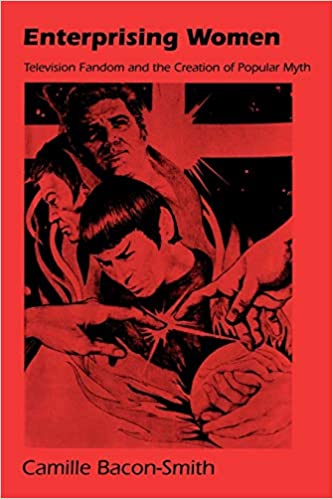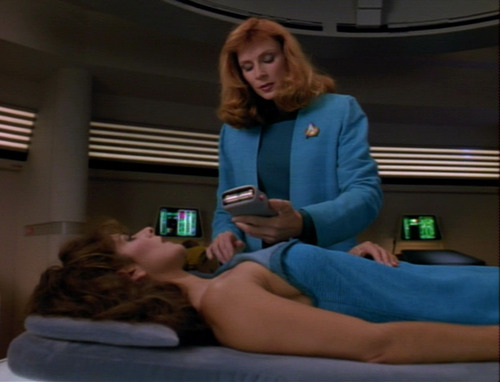I recently finished Camille Bacon-Smith’s book Enterprising Women: Television Fandom and the Creation of Popular Myth (1992). It’s a fascinating history of the women who built early Star Trek fandom, particularly those who wrote fanfic; created fanvids, fan art and filk music; and took part in cosplay. Bacon-Smith spends a lot of time speaking to women from various walks of life who took part in these fan activities through the late 1980s, learning about their backgrounds, processes and what made them want to be creators in the fandom.
Here are a few quotes I wanted to pull out for you all, starting with this one that exemplifies how the development of early Trek fandom connected with early feminist awakenings:
Until this period in my life, I had not ambitions in life except to be a good wife and mother, at which I was failing miserably. If I had been succeeding at it, possibly – I am not a mother – I would not have turned to fandom, or discovered that I was a writer or a fan…these things irritated my husband because he married one type of women and I was turning into another type of woman.
[Now, after the divorce] I look at my friends and I say, Gee, I am the friend of these people and they are my friends because I’m me. A lot of people have friends to look good. It’s more like they are my friends because I’m worth it. And I am their friend because they are worth it.
Ann, a fanfic writer
Many well-known writers got their start in fanfic, well before the 50 Shades of Grey days:
When it came out in 1966, I started watching it…I was the right age, fifteen, sixteen, thereabouts…and I wrote an endless ‘Mary Sue’ novel when I was a kid…
I was that age I really needed Trek, because I was in the homely adolescent stage when boys were terrifying and Star Trek provided a world of hope. And Uhura provided confirmation that women could get somewhere and you know, I really needed it in those days
SF writer A.C. Crispin
One observation I really liked was this one by Bacon-Smith about telepathy in fanwriting:
[Women fanwriters] have developed telepathy as a code for the ideal form of understanding, empathy expanded to include thought as well as emotion. Fanwriters use telepathy both as an integral part of Spock’s Vulcan culture and as a metaphor for the understanding that accompanies deeply felt interpersonal relationships…
In the Blake’s 7 character Cally, who can never experience the telepathic presence of another because her people are dead and the humans cannot communicate on that level, the loneliness of many women who feel that they give understanding but receive nothing back to nurture their sense of belonging finds representation.
To the women of the media fandom community, telepathy codes the possibility of complete understanding of another person, of incorporating into the self that other being with all its strangeness, and of exposing the self to the stranger. Mr. Spock represents the positive value of an understanding merged with the other, while Cally represents the tragedy when comprehension of the totality of the other is forever denied.
Camille Bacon-Smith











